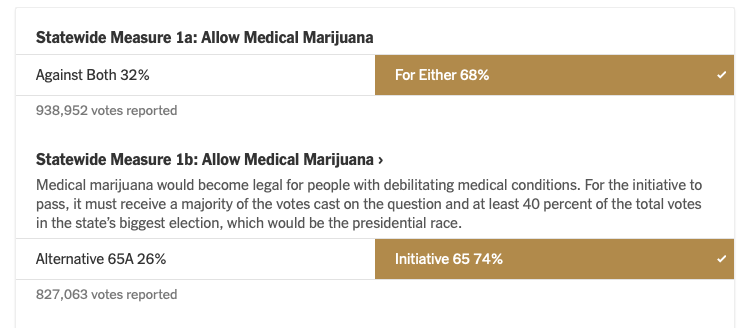With over 60 percent of the vote in Wednesday morning, 74 percent of voters chose Initiative 65, the citizen-sponsored ballot initiative. This was the second part of a two-step process because of the legislative alternative. In the first question, 68 percent said “for either.” If a majority had said “against both,” the initiative would have died regardless of the second question.

As written in the initiative, the Mississippi Department of Health will be responsible for developing regulations for the program by July 1, 2021. Medical marijuana patient cards will need to be issued by August 15, 2021.
Here is how the process will work.
A person must have a debilitating medical condition. The term “debilitating medical condition” is defined in the proposal as one of 22 named diseases, plus there is a special allowance for a physician to certify medical marijuana for a similar diagnosis.
Some of those conditions include:
A person with a debilitating medical condition is examined in-person and in Mississippi by a physician. The term “physician” is defined in the proposal as a Mississippi-licensed M.D. or D.O.
If the physician concludes that a person suffers from a debilitating medical condition and that the use of medical marijuana may mitigate the symptoms or effects of the condition, the physician may certify the person to use medical marijuana by issuing a form as prescribed by the Mississippi Board of Health.
The issuance of this form is defined in the proposal as a “physician certification” and is valid for 12 months, unless the physician specifies a shorter period of time.
A person with a debilitating medical condition who has been issued a physician certification becomes a qualified patient under the proposal.
A qualified patient then presents the physician certification to the Mississippi Department of Health and is issued a medical marijuana identification card.
The ID card allows the patient to obtain medical marijuana from a licensed and regulated treatment center and protects the patient from civil and/or criminal sanctions in the event the patient is confronted by law enforcement officers.
“Shopping” among multiple treatment centers is prevented through the use of a real-time database and online access system maintained by the Mississippi Department of Health.
Medical Marijuana Treatment Centers will be registered with, licensed, and regulated by the Mississippi Department of Health. Each medical marijuana business will have to apply to and be approved by MDH. But there will not be a limit on the number of businesses, allowing for a free market based on demand.
Users would not be able to smoke medical marijuana in a public place and home grow would be prohibited, though it is legal is some other states.